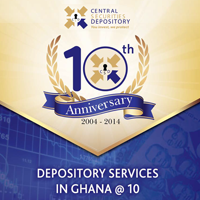The Bank of Ghana (BoG) plans to sell GH¢200million of the bonds at two auctions in August and November, after the Ministry of Finance had promised to restructure Government debt to curb high debt-service costs.
Hitherto, only three- and five-year bonds have been issued by the BoG in the domestic debt market, and the introduction of seven-year bonds is an attempt to deepen the market and test investors’ enthusiasm for longer-tenor instruments, which hopefully would help to lower Government’s overall borrowing costs.
The main draw for investors will be “the apparent high yields that the country offers, which compare very favourably with yields across Africa,” said Sampson Akligoh, Head of Research at Databank in Accra.
“In the short term, there is no reason for investors to shy away from Ghanaian bonds, but the success of the issue will also depend largely on the local primary dealers, who must help to create the market.”
Ghana has offered fat yields on Treasury bills and bonds since the first half of 2012, when a rapid depreciation of the cedi -- blamed on capital flight and growing spending on imports -- compelled the BoG to hike interest rates to mop up excess liquidity in the economy.
While yields on Government paper with less than three years maturity doubled to between 22-23 percent from February to December 2012, the interest rate on three- and five-year bonds soared to 21 percent and 23 percent respectively in the same period.
Though three-year borrowing costs have since plummeted to 19.2 percent as at May 2013, short-term yields have been inflexibly high and Government has planned to use part of the US$1billion it is targetting from the country’s second Eurobond to buy back some of these expensive debts.
“It is always wise economic policy to shift from a reliance on short-term to long-term borrowing,” said Collins Appiah, Executive Director at NDK Asset Management in Accra. “Because there’s uncertainty about what will happen in seven years, people will want to invest now because these yields are fixed over the period.”
For pension funds, the seven-year bond is a boon, the analysts told B&FT. “Pension fund managers are looking for more investible securities, and the seven-year bond will provide some respite,” said Mr. Akligoh.
He added that though Government “does not have a strong macroeconomic story to sell, the prospects for stronger growth and continuing oil discovery show that debt-service capacity could improve over the medium-term.”
Mr. Appiah said the bond will be a good investment for pension funds, but for foreign investors -- who hold about a third of three- and five-year bonds -- they seem to be a bit concerned about the overall economy picture “which is not too good at the moment”.
Source: Business & Financial Times


